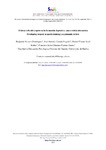Mostrar o rexistro simple do ítem
El desarrollo del respeto en la formación deportiva: una revisión sistemática
| dc.contributor.author | Navarro Domínguez, Benjamín | |
| dc.contributor.author | Cerrada Nogales, José Antonio | |
| dc.contributor.author | Abad Robles, Manuel Tomás | |
| dc.contributor.author | Giménez Fuentes-Guerra, Francisco Javier | |
| dc.date.accessioned | 2021-01-12T13:31:41Z | |
| dc.date.available | 2021-01-12T13:31:41Z | |
| dc.date.issued | 2020-09 | |
| dc.identifier.citation | Navarro Domínguez, B., Cerrada Nogales, J. A., Abad Robles, M. T., & Giménez Fuentes-Guerra, F. J. (2020). El desarrollo del respeto en la formación deportiva: una revisión sistemática. Sportis. Scientific Journal of School Sport, Physical Education and Psychomotricity, 6(3), 533-554. https://doi.org/10.17979/sportis.2020.6.3.6527 | es_ES |
| dc.identifier.issn | 2386-8333 | |
| dc.identifier.uri | http://hdl.handle.net/2183/27087 | |
| dc.description.abstract | [Resumen] La práctica deportiva bien orientada puede fomentar al desarrollo valores tales como el respeto, el autocontrol, el esfuerzo, la autonomía y el liderazgo. En este sentido, el objetivo de este estudio fue doble: 1) realizar una revisión sistemática relativa a las investigaciones que examinaban los efectos de alguna intervención sobre el desarrollo del respeto en la formación de jóvenes deportistas; y 2) describir y analizar dichas intervenciones. Para tales fines, se llevó a cabo una revisión sistemática en la que se estudiaron y analizaron diferentes investigaciones sobre el respeto en el ámbito deportivo y de la Educación Física. Para realizar esta revisión sistemática se empleó la Declaración PRISMA. Los resultados más destacados hacen referencia a la aplicación exitosa del Modelo de Responsabilidad Personal y Social de Hellison (TPRS) y de la Educación Deportiva de Siedentop. De esta manera, tanto en el contexto escolar como en el de clubes deportivos, la utilización de intervenciones relacionadas con los Modelos mencionados es aconsejada cuando se pretende fomentar el respeto. | es_ES |
| dc.description.abstract | [Abstract] The practice of sport can promote the development of values such as respect, self-control, effort, autonomy and leadership. In this sense, the aim of this study was twofold: 1) to carry out a systematic review of research analyzing the effects of any intervention on the development of respect in the training of young athletes; 2) to describe and examine such interventions. To this end, a systematic review was carried out in which different research on respect in the field of sport and physical education was studied and analysed. The PRISMA Statement was used to conduct this systematic review. The most outstanding results refer to the successful application of Hellison's Personal and Social Responsibility Model (TPRS) and Siedentop's Sports Education. Thus, both in the school context and in the sports club context, the use of interventions related to the above-mentioned models is recommended when respect is to be encouraged. | es_ES |
| dc.language.iso | spa | es_ES |
| dc.publisher | Universidade da Coruña | es_ES |
| dc.relation.uri | https://doi.org/10.17979/sportis.2020.6.3.6527 | es_ES |
| dc.rights | Atribución-NoComercial-SinDerivadas 4.0 España | es_ES |
| dc.rights.uri | http://creativecommons.org/licenses/by-nc-nd/4.0/es/ | * |
| dc.subject | Educación deportiva | es_ES |
| dc.subject | Responsabilidad personal y social | es_ES |
| dc.subject | Valores | es_ES |
| dc.subject | Sport education | es_ES |
| dc.subject | Personal and social responsibility | es_ES |
| dc.subject | Values | es_ES |
| dc.title | El desarrollo del respeto en la formación deportiva: una revisión sistemática | es_ES |
| dc.title.alternative | Developing Respect in Sports Training: A Systematic Review | es_ES |
| dc.type | info:eu-repo/semantics/article | es_ES |
| dc.rights.access | info:eu-repo/semantics/openAccess | es_ES |
| UDC.journalTitle | Sportis | es_ES |
| UDC.volume | 6 | es_ES |
| UDC.issue | 3 | es_ES |
| UDC.startPage | 533 | es_ES |
| UDC.endPage | 554 | es_ES |






